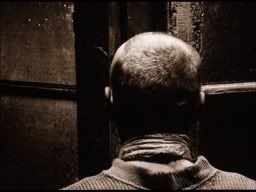Watching Tarkovsky's Stalker uncovers the potential of cinema as a medium. We are never sure whether we are watching an artist or a magician; the truth is, the director is both, often simultaneously. Immediately we are struck by the aesthetics: the lighting is perfection, the control and patience of the shots chosen unmatched; furthermore, Tarkovsky is one of the cinema's great portraiters as well as a commendable landscape photographer. I fell in love with Alexander Kaidanovsky's head about twenty minutes in and the sympathy I felt for his character never left me.
 Truthfully there are literally tens of shots in the film that suggest the director's genius, some of them, true to form, lasting for minutes on end. Our early shepherding into and out of the doorway into the bedroom, the continuous take on Monkey's progress down a slope as it is slowly revealed she is being carried rather than walking, the iconoclastic drift over images of the gods of our modern collective consciousness. (Jesus in prayer, money, a gun.) Perhaps the best example of the artist/magician duality is the final scene that at least deserves to be famous, in which Monkey moves a glass across a table with her mind. Or does she? Is she merely observing it's being progressed by the vibrations of a passing train? Our willingness to believe the unbelieveable, though, is a testament not to Tarkovsky's skill with a camera, but his understanding of psychology.
Truthfully there are literally tens of shots in the film that suggest the director's genius, some of them, true to form, lasting for minutes on end. Our early shepherding into and out of the doorway into the bedroom, the continuous take on Monkey's progress down a slope as it is slowly revealed she is being carried rather than walking, the iconoclastic drift over images of the gods of our modern collective consciousness. (Jesus in prayer, money, a gun.) Perhaps the best example of the artist/magician duality is the final scene that at least deserves to be famous, in which Monkey moves a glass across a table with her mind. Or does she? Is she merely observing it's being progressed by the vibrations of a passing train? Our willingness to believe the unbelieveable, though, is a testament not to Tarkovsky's skill with a camera, but his understanding of psychology. This scene follows what has been as much a psychoanalytical journey as a theological one. It is impossible not to pick up on the clumsy Id, Ego and Superego dynamic provided by the three (male) leads, but the Wittgensteinian undertones are far more subtle. The Zone, where our three heroes journey, is a metaphor for the functional world, a world of prepositions and language traps, where markers must be lain down to navigate in chaos. Just as we require illogical spatial recognitions to stay sane - Home, School, Work, Local Shop, Abroad, etc. - so does Stalker throw nuts to mark their progress before they've made it. Space is relative in this linguistic realm, and Stalker, who tries to impose his own rules on it, must thus lose the most at the pilgrimage's conclusion, in which it is revealed the Holy Grail of the story is a somewhere between a placebo and a subconscious manipulation of the universe (one theory posits that Monkey is born out of Porcupine's wish for his brother's return and is hence a reincarnation via subatomic reasoning). What is interesting is that it is Professor, ostensibly the broken, castrated Superego, who attempts to destroy Room in the Zone, where wishes are meant to be granted. His rejection of the oxymoronic scientific supernatural represents the ultimate failure of the Symbolic Circuit in Leary's model, and perhaps the culmination of a cinematic thesis extension of Lacan's Symbolic order.
This scene follows what has been as much a psychoanalytical journey as a theological one. It is impossible not to pick up on the clumsy Id, Ego and Superego dynamic provided by the three (male) leads, but the Wittgensteinian undertones are far more subtle. The Zone, where our three heroes journey, is a metaphor for the functional world, a world of prepositions and language traps, where markers must be lain down to navigate in chaos. Just as we require illogical spatial recognitions to stay sane - Home, School, Work, Local Shop, Abroad, etc. - so does Stalker throw nuts to mark their progress before they've made it. Space is relative in this linguistic realm, and Stalker, who tries to impose his own rules on it, must thus lose the most at the pilgrimage's conclusion, in which it is revealed the Holy Grail of the story is a somewhere between a placebo and a subconscious manipulation of the universe (one theory posits that Monkey is born out of Porcupine's wish for his brother's return and is hence a reincarnation via subatomic reasoning). What is interesting is that it is Professor, ostensibly the broken, castrated Superego, who attempts to destroy Room in the Zone, where wishes are meant to be granted. His rejection of the oxymoronic scientific supernatural represents the ultimate failure of the Symbolic Circuit in Leary's model, and perhaps the culmination of a cinematic thesis extension of Lacan's Symbolic order.More mythological is the introduction of a black dog that follows the trio. Undoubtedly Anubis, it consumes whilst Stalker talks of hearts, attaches itself to Stalker in his own words, and whines at Monkey's Osiric annointment by Beethoven. In other scenes it lingers, a curious reminder that in the Zone, just as in life, death (and judgement?) is around every corner. Whilst not quite Tarkovsky's masterpiece (that is undoubtedly Zerkalo (1975)), Stalker is a fascinating film whichever way you look at it and a worthy addition to his oeuvre.

No comments:
Post a Comment